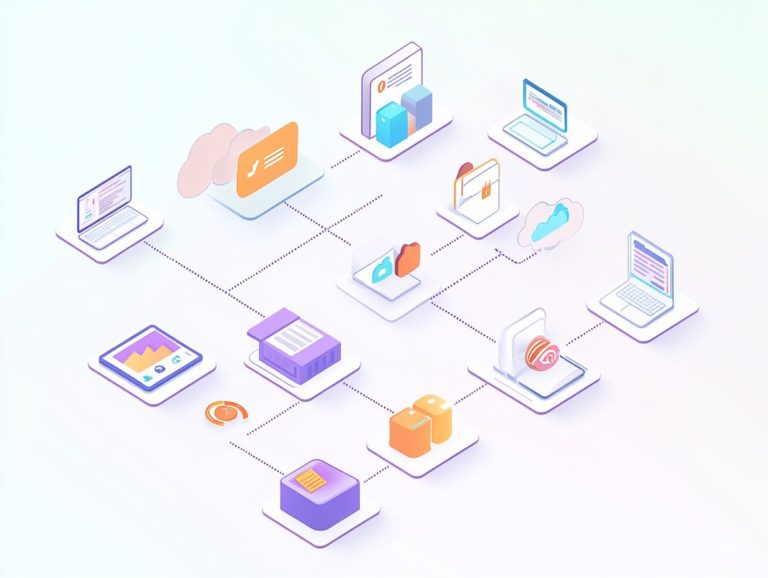Common CRM Implementation Challenges
Implementing a CRM means integrating it into your business to improve customer interactions, but it comes with challenges. You may face hurdles like securing user buy-in, managing data, and overcoming integration issues. These obstacles can easily derail your efforts if not addressed properly.
This article highlights common challenges during CRM implementation and offers best practices to navigate these issues. Discover how to facilitate a smoother transition and fully harness the benefits of your CRM system.
Contents
- Key Takeaways:
- Common Challenges Faced During CRM Implementation
- Best Practices for Overcoming CRM Implementation Challenges
- Frequently Asked Questions
- What are some common challenges that businesses face during CRM implementation?
- How can a lack of employee buy-in be addressed during CRM implementation?
- What can lead to data integration issues during CRM implementation?
- How can resistance to change be overcome during CRM implementation?
- How can inadequate training be avoided during CRM implementation?
- What are some potential consequences of not effectively addressing common CRM implementation challenges?
Key Takeaways:

Lack of user buy-in is a major challenge in CRM implementation, but effective change management strategies can help overcome this barrier.
Data management and integration challenges are common obstacles during CRM implementation, but understanding the most common CRM software challenges and utilizing CRM features and tools can streamline the process.
Continuous training and support are crucial for successful CRM adoption, emphasizing the importance of addressing implementation challenges throughout the entire process.
What is CRM Implementation?
Implementing a CRM means integrating it into your business to improve customer interactions, streamline processes, and drive growth. It requires a well-thought-out plan that aligns technology with your organizational culture, ensuring the CRM solutions you choose enhance your sales process and meet your specific business goals.
The key phases of the CRM implementation journey include:
- Assessing your needs
- Selecting the right software
- Customizing it to fit your requirements
- Training users
- Consistently evaluating the system’s performance
Tackling challenges like moving your existing data to the new system and ensuring compatibility with existing systems is vital for a seamless transition. Don t forget the importance of user adoption; involving your employees early fosters their buy-in and paves the way for smoother integration.
When you implement a CRM solution effectively, it transforms into a powerful asset for personalizing customer engagement and driving sales. This supports sustained business growth through enhanced customer loyalty and satisfaction.
Common Challenges Faced During CRM Implementation
Implementing a CRM system can unlock new opportunities, but implementing CRM in a startup environment comes with obstacles that need to be tackled for successful user adoption and efficient data management.
You might encounter common hurdles such as:
- Communication gaps between departments
- Lapses in leadership oversight
- Integration issues that can significantly impede the effectiveness of the new system
Recognizing and addressing these obstacles is essential for maximizing the potential of your CRM investment.
Lack of User Buy-in
A significant challenge during CRM implementation is the lack of user buy-in, often caused by insufficient communication and inadequate training. Without management s support, user adoption is less likely. This can lead to ineffective use of the CRM system and missed opportunities to strengthen customer relationships.
To ensure a successful transition, engage with employees early, clearly presenting the vision and benefits of the CRM. Effective training can address concerns and show how the system can enhance their daily tasks.
Fostering a culture of collaboration will make everyone feel included, increasing their likelihood of embracing the new tools. Maintain leadership oversight during implementation to ensure employees receive the necessary support and resources, paving the way for smoother integration and improved customer interactions.
Act now to embrace these best practices for a successful CRM implementation!
Data Management Issues

Data management issues often arise during CRM implementation. To navigate these challenges effectively, understanding how to implement CRM software successfully is crucial, as it affects how accurate and organized your customer information is.
You must address data security and compliance needs. This will protect sensitive information and help your CRM system support better decision-making.
If you don t tackle these issues, your operations can become inefficient. Effective integration support can harmonize various data sources and enhance productivity.
Without organized data, extracting valuable insights from customer interactions becomes difficult. Implementing feedback mechanisms can significantly improve data quality by valuing customer input.
Bringing in external experts can provide fresh perspectives. Their technical know-how can help you navigate these challenges, ensuring your CRM system excels in building customer relationships.
Integration Challenges
Integration challenges can be a major hurdle in CRM implementation. You need to ensure your new system fits smoothly with existing technologies.
If integration falls short, you ll face issues like isolated data and operational inefficiencies. This means you’ll need effective IT troubleshooting and careful software selection.
A cohesive technology environment requires more than just the right tools. Focus on resource allocation and project assessment to navigate this complex landscape.
Your IT teams are crucial in spotting potential obstacles early. Ensure management support is available to tackle any concerns that arise.
By concentrating on these areas, you can make the transition smoother. Protect against disruptions and drive successful CRM adoption aligned with your organizational goals.
Training and Adoption
Effective training and adoption strategies are vital for CRM success. They equip you and your team with the skills needed to use the system efficiently.
Leadership oversight fosters continuous learning and teamwork. Along with building foundational skills, training nurtures a culture where feedback is genuinely valued.
This approach helps identify effective solutions to user challenges. Securing management buy-in is essential for allocating resources to reinforce best practices.
When users feel supported through targeted training, adoption rates increase. This leads to greater satisfaction and productivity in your organization.
Best Practices for Overcoming CRM Implementation Challenges
To navigate CRM implementation complexities, adopt best practices that address common challenges. These practices include avoiding the top CRM implementation mistakes.
- Securing management support
- Investing in comprehensive employee training
- Fostering a culture of collaboration
By doing this, you can ensure seamless integration with your existing operations, paving the way for greater success.
Effective Change Management Strategies

Implementing effective change management strategies is vital for successful user adoption. Clear communication minimizes resistance during CRM implementation.
Adequate employee training and management support reinforce the transition. Fostering a collaborative environment enhances these strategies.
Regular feedback loops allow leadership and employees to share concerns and suggestions. This fosters a sense of ownership in the process.
Choosing a user-friendly CRM reduces friction with new systems. With strong leadership support, these elements create a solid foundation for a smooth transition.
Utilizing CRM Features and Tools
Leveraging CRM features is essential for operational efficiency. Focus on automation and robust reporting to streamline processes.
Integration capabilities connect various software platforms. This ensures all data sources work together, enhancing data management.
Investing in employee training boosts adoption of these tools. This enables staff to utilize the full range of features effectively.
By prioritizing training, you significantly elevate competitiveness. This, in turn, enhances customer satisfaction.
Continuous Training and Support
Continuous training and support are essential for CRM success. This ensures your team has the latest knowledge and skills.
Ongoing training fosters user adoption and a culture of learning. Management support is crucial for prioritizing development.
Interactive workshops and online resources enhance engagement. Making training accessible and enjoyable is key.
Regular check-ins and feedback highlight employee input. Creating an environment for feedback retention helps teams stay adaptable.
The Importance of Addressing CRM Implementation Challenges
Addressing CRM challenges is vital for optimizing strategies. Proactively identifying issues enhances customer retention and communication.
Prioritizing user adoption is crucial. Ensure every team member is motivated to fully utilize the system.
Effective data organization fosters seamless information flow. This leads to better decisions and deeper customer insights.
Management buy-in is essential. Leaders must show commitment to cultivate collaboration and accountability.
Overcoming implementation challenges streamlines operations. This enriches the customer experience and promotes sustainable growth.
Frequently Asked Questions

What are some common challenges that businesses face during CRM implementation?
Some common CRM implementation challenges include lack of employee buy-in, data integration issues, resistance to change, and inadequate training.
How can a lack of employee buy-in be addressed during CRM implementation?
Employee buy-in improves when you clearly communicate the benefits of the CRM system. Involving employees in the selection and customization process boosts their confidence.
What can lead to data integration issues during CRM implementation?
Data integration problems often arise from outdated software or poor data quality. Thoroughly assess these challenges before implementation to avoid complications.
How can resistance to change be overcome during CRM implementation?
Involve employees in decision-making to help reduce resistance. Clear communication and training can also show how the CRM will positively impact their daily tasks.
How can inadequate training be avoided during CRM implementation?
Develop a training plan that covers all aspects of the CRM system. Include in-person sessions, online tutorials, and ongoing support tailored to employees’ needs.
What are some potential consequences of not effectively addressing common CRM implementation challenges?
Ignoring common CRM issues can lead to low adoption rates and poor data quality. This results in wasted time, resources, and can hinder the CRM’s overall success.






